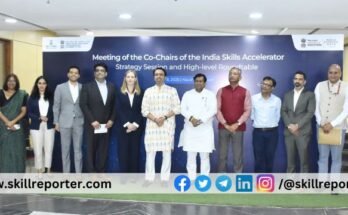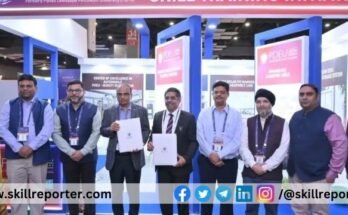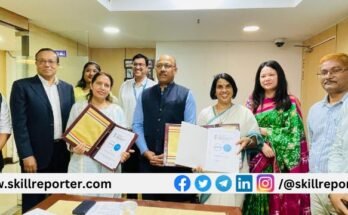Frankfurt : Singapore is aiming for 12 per cent of every student cohort to undergo the “Work-Study Pathway” by 2030, providing students with on-the-job training and classes.
Mdm Halimah, who is on a state visit to Germany, said that this system would be effective in “helping the young people to integrate into the industry”.During her five-day state visit, Singapore and Germany have signed 14 agreements, with half of them focused on education and the workforce.
Speaking to reporters at the end of her visit, Mdm Halimah said Germany’s dual education system was something Singapore can learn from, in creating “different pathways (and) careers for people”.
Mdm Halimah, who visited three German companies – Bosch, Continental AG and ABB-Stotz – said: “The German companies actually pay for the trainees to be trained. Like for one company, they were telling me that they paid as much as €70,000. When they have invested so much, they feel that it is really important for them to develop a very effective ecosystem to support the intern so that he can succeed in the company and continues to grow.”
Refer SkillReporter (www.SkillReporter.com) for skill development and The Edupress (www.TheEduPress.com ) for education related important News, Tenders, RFP, Jobs, EOI, Events, Announcements, Circulars, Notices and other useful updates. Content also shared on Facebook Twitter Linkedin
On Friday, Mdm Halimah witnessed the signing of a five-year Memorandum of Understanding between the Institute of Technical Education (ITE) and German electronics company Rohde & Schwarz. It will offer industrial and educational exchanges for students and apprentices from both countries for at least two weeks.
During her visit, Mdm Halimah met with German President Frank-Walter Steinmeier, German Chancellor Angela Merkel, Berlin Mayor Michael Muller and Hesse Minister-President Volker Bouffier. They discussed issues such as climate change and increasing polarisation in society.
Looking ahead, she said they agreed that it’s also important for both countries to look at new areas of collaboration such as research and artificial intelligence, especially since Germany is going through technological disruptions.
“They are leveraging very much on their strength – that is their strength in hardware, in applications, for instance, precision engineering,” said Mdm Halimah.
“We also have strengths. Our strength is in software and system integration. And this is where we can then look at ways of how to synergise, co-innovate and collaborate.”
Education Minister Ong Ye Kung, who accompanied Mdm Halimah on the visit, said the German-speaking part of Europe has a very strong tradition in vocational and apprenticeship training. He also made the point that about 70 per cent of each cohort in Singapore goes through vocational education in either the polytechnics or ITE. It was Singapore’s version of the dual education system.
Note: News shared for public awareness with reference from the information provided at online news portals.



